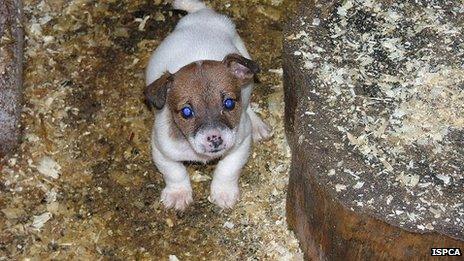Dogs trafficked in 'large numbers', say animal charities
- Published

Ireland has introduced a licensing scheme to help combat illegal dog breeding
Up to 1,000 dogs are being trafficked into Britain each week from unlicensed Irish puppy farms, an Irish animal welfare charity says.
The ISPCA told the BBC huge numbers of puppies were being bred illegally in Ireland specifically for the UK market.
Many dogs are bred in conditions that fail basic welfare standards and are infected with parasites and disease.
The UK Border Agency says it informs animal agencies when animals are discovered during routine checks.
Authorities in the Irish Republic believe recent finds are evidence of organised puppy smuggling schemes, involving dogs thought to be destined for the UK.
In October, 36 puppies packed into cardboard boxes were found in the back of two vans in Dublin - they were suffering from mange, ear mites, fleas, eye infections and parasitic infections.
Two days later, another 56 puppies were seized by Irish police at Dublin Port and a further 26 dogs were discovered in the back of a horse box in Tipperary.
"There's no doubt that a large number of them are being trafficked out of the country every week through the Irish ports," says chief inspector of the ISPCA Conor Dowling, speaking to the BBC's 5 live Investigates programme.
'Vast profit'
Importing puppies to the UK is legal if the correct paperwork is in place and welfare standards are met.
Irish authorities tightened controls last July - but the ISPCA and another animal charity, the Dogs Trust, say some breeders are not complying with the new rules.
Once in the UK, the puppies are sold onto rogue dealers who hide the dogs' true health and origin.
The RSPCA says 87 puppies were discovered in raids in Stockport and Greater Manchester earlier this week. Two people were arrested and subsequently released on bail.
"We believe the vast majority of these dogs had originated from Ireland and were brought over here for sale," the RSPCA's chief inspector Ian Briggs told the BBC.
"There are underlying health problems with a number of the animals, which are currently being investigated by veterinary surgeons and RSPCA inspectors.
"We are aware of a number of gangs that are purely bringing dogs over from Ireland to sell over the internet in England and Wales.
"They are turning over vast amounts of profit," Mr Briggs says - some dogs can fetch up to £1,000.
Lisa Headington, from Southampton, bought a cavachon puppy for her daughter and believes it came from a puppy farm.
"He was very dirty and I don't think he had been cleaned at all since he'd been born. He was very nervous, very scared," she told 5 live Investigates.
"You don't expect all these problems when you bring home this little bundle of joy at what is supposed to be a really happy time," she added.
Another owner told the programme she bought a Pomeranian puppy for £550 after seeing an advert online.
The puppy became sick just hours after it was brought home and a fortnight later it was put down. Vets found it to be suffering from pneumonia and seizures. It also had a hernia.
The owner was informed it had probably been trafficked from the Irish Republic.
The Department for Environment, Food and Rural Affairs has published advice on buying cats and dogs, external for prospective owners.
'Crammed into crates'
New legislation - the Dog Breeding Establishments Act - was introduced in the Irish Republic earlier this year.
Under the new act, anyone who owns six or more breeding female dogs over the age of six months must have a licence - without it, breeders are operating illegally.
Since it came into force, just 120 dog breeding establishments have applied for registration and only 42 have been officially registered - which includes boarding kennels and animal shelters.
Animal charities warn these tougher rules could be responsible for the rise in the number of dogs being shipped to the UK as many breeders are unable to meet the new standards.
"Unfortunately the unregulated breeders will transport puppies any way they can," says Mark Beazley, executive director of the Dogs Trust in Ireland.
"This might include small unsuitable crates in the back of private cars or larger vehicles where large numbers of puppies are crammed into totally unsuitable crates or other carrying devices."
A spokesperson for the UK Border Agency told the BBC: "Border Force has responsibility for checking the importation of endangered species into the UK from non-EU countries only.
"Where officers detect other live animals during our normal checks, they will inform the Animal Health and Veterinary Laboratories Agency or the local authority who have responsibility for taking enforcement action."
You can listen to the full report on 5 live Investigates on Sunday, 2 December, at 21:00 GMT on BBC 5 live.
Listen again via the 5 live website or by downloading the 5 live Investigates podcast.
- Published13 October 2012
- Published10 October 2012